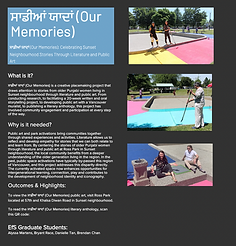What are UBC EfS Students doing to make our city more sustainable?
FridgeShare: A Community Fridge Program
What is it?
We need systems change and social solidarity to address our world’s most pressing issues. FridgeShare exists to address food insecurity and food waste through a model of mutual-aid.
FridgeShare is a community fridge for people to take what they need, and leave what they can, all while supporting collective solutions for food insecurity and food waste in the City of Vancouver.
Outcomes & Highlights:
FridgeShare’s first community fridge was piloted at Convivial Café (680 Leg-in-Boot Square), helping to address food insecurity and food waste in the False Creek South neighbourhood. While Convivial is not a “public space” per se, the fridge was available for anyone to come in and take or leave food, without purchasing anything.
EfS Graduate Students:
EfS Graduate Students: Kelly Chessman, Julia Gellman, Erica Ellis, Kelly Davies




Exploring Our Roles
An English Conversation Club for Newcomers Examining the Legacies of Colonial Harm in Vancouver
What is it?
Exploring Our Roles is an English conversation club for newcomers examining the topics of colonization, reconciliation and systemic racism in Canada. We started from the basic premise that we are all learning. None of us are experts, but we all do have a role and responsibility to play in taking meaningful action towards reconciliation. No matter how we got here, or why we came, we are now all living on unceded land and we need to be committed to taking action.
Outcomes & Highlights:
After piloting our project with a group of newcomers on Zoom in the Fall of 2020, we redeveloped our curriculum and content into an accessible website (Exploring our Roles). All of our lessons, powerpoints and learning are available online for free and can be easily adapted to fit different contexts. We are also offering facilitator training sessions to community partners and stewards and presenting at local education conferences. We hope that this contribution will assist in the creation of a more positive and regenerative path forward for all on this land.
EfS Graduate Students
Jenna Dur, Tobias Lemay, Meekyoung Jeung








ਸਾਡੀਆਂ ਯਾਦਾਂ :Our Memories
Celebrating Sunset Neighbourhood Stories Through Literature and Public Art
What is it?
ਸਾਡੀਆਂ ਯਾਦਾਂ : Our Memories is a creative placemaking project that draws attention to stories from older Punjabi women living in Sunset neighbourhood through literature and public art. From conducting research, to facilitating a 20-week written and oral storytelling project, to developing public art with a Vancouver muralist, to publishing a literary anthology, this project has involved community engagement and participation at every step of the way.
Why is it needed?
Public art and park activations bring communities together through shared experiences and activities. Literature allows us to reflect and develop empathy for stories that we can both relate to and learn from. By centering the stories of older Punjabi women through literature and public art at Ross Park in Sunset neighbourhood, the local community benefits from a deeper understanding of the older generation living in the region. In the past, public space activations have typically by-passed this region of Vancouver, and this project addresses this disparity directly. The currently activated space now enhances opportunities for intergenerational learning, connection, play and contributes to the development of neighborhood identity and iconography.
Outcomes & Highlights:
To view the ਸਾਡੀਆਂ ਯਾਦਾਂ : Our Memories, public art, visit Ross Park located at 57th and Khalsa Diwan Road in Sunset neighbourhood.
To read the ਸਾਡੀਆਂ ਯਾਦਾਂ :Our Memories, literary anthology, scan this QR code:
EfS Graduate Students:
Alyssa Martens, Bryant Race, Danielle Tan, Brendan Chan




Reasonably Radical: A Climate Change Education Podcast
What is it?
Reasonably Radical: A Climate Change Education Podcast is a new form of professional development for our increasingly uncertain world – one that is honest, urgent, hopeful, and above all, radical! Through this journey, listeners will come to see why climate change education isn’t working, and what we can do to change that. Our students need to become systems thinkers who can connect the dots, finding and advocating for solutions that address the roots of complex problems, like achieving climate justice and tackling systemic inequality. Join us to learn what this radical education could look like, and get ready to become a climate change educator!
Why is it needed?
All our research, locally and globally, gave us the same information: teachers want to be teaching about climate change but don’t feel like they know how. The gap isn’t in the desire, it’s in the method. Teachers want to teach about climate justice, and students want to engage in what will be the most meaningful topic of their lifetimes.
Outcomes & Highlights:
To tune into our podcasts or to learn more about Reasonably Radical, check out our work at www.reasonablyradical.ca.
EfS Graduate Students:
EfS Graduate Students: Jasmine Hare, Katelyn Jmaeff, Kathryn Payne, Derek Van Deursen



Roots to Resilience: A Community Engagement Framework
Why is it needed?
By the 2050’s, climate change is expected to bring Vancouver a 5% increase in winter rain volume and a considerable increase in extreme rainfall events, potentially leading to flooding and sewer backups.
Green Infrastructure (GI) has an important role to play in Vancouver’s climate change resilience. It is a crucial, but an often unseen piece of the puzzle that can help the city to reduce climate change vulnerability.
It is important that communities are educated about green infrastructure and engaged in caring for these sites. Communities who understand and benefit from GI sites are more likely to be motivated to advocate for more green infrastructure and support stronger climate change policies. Our new community engagement framework will help to pave the way for this work to happen.
EfS Graduate Students
Ben Johnston, Aubree McAtee, Rachel Nogard, Kelly Gardner





















